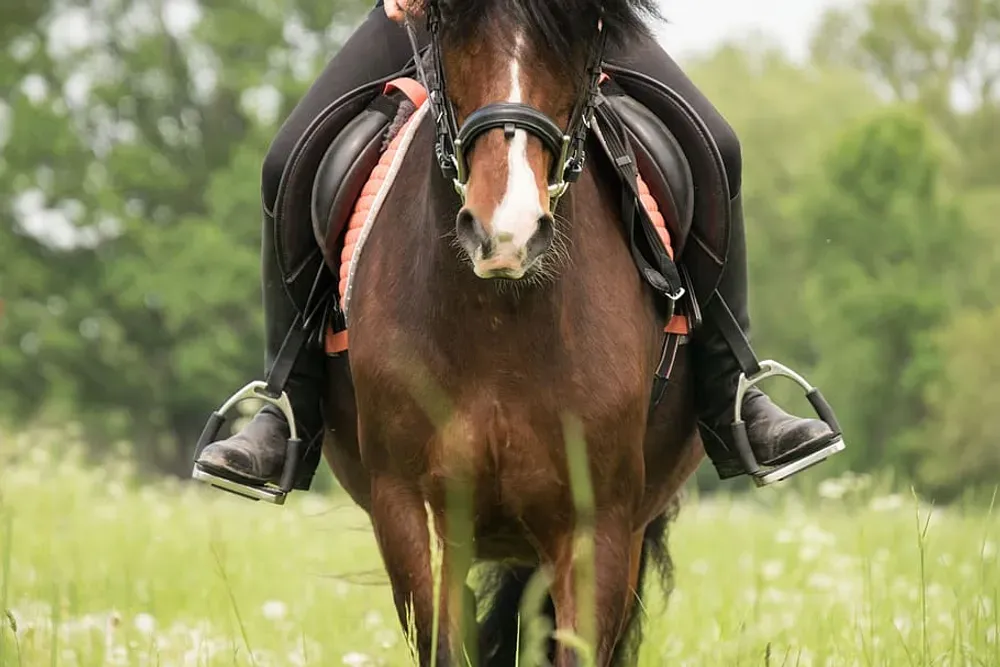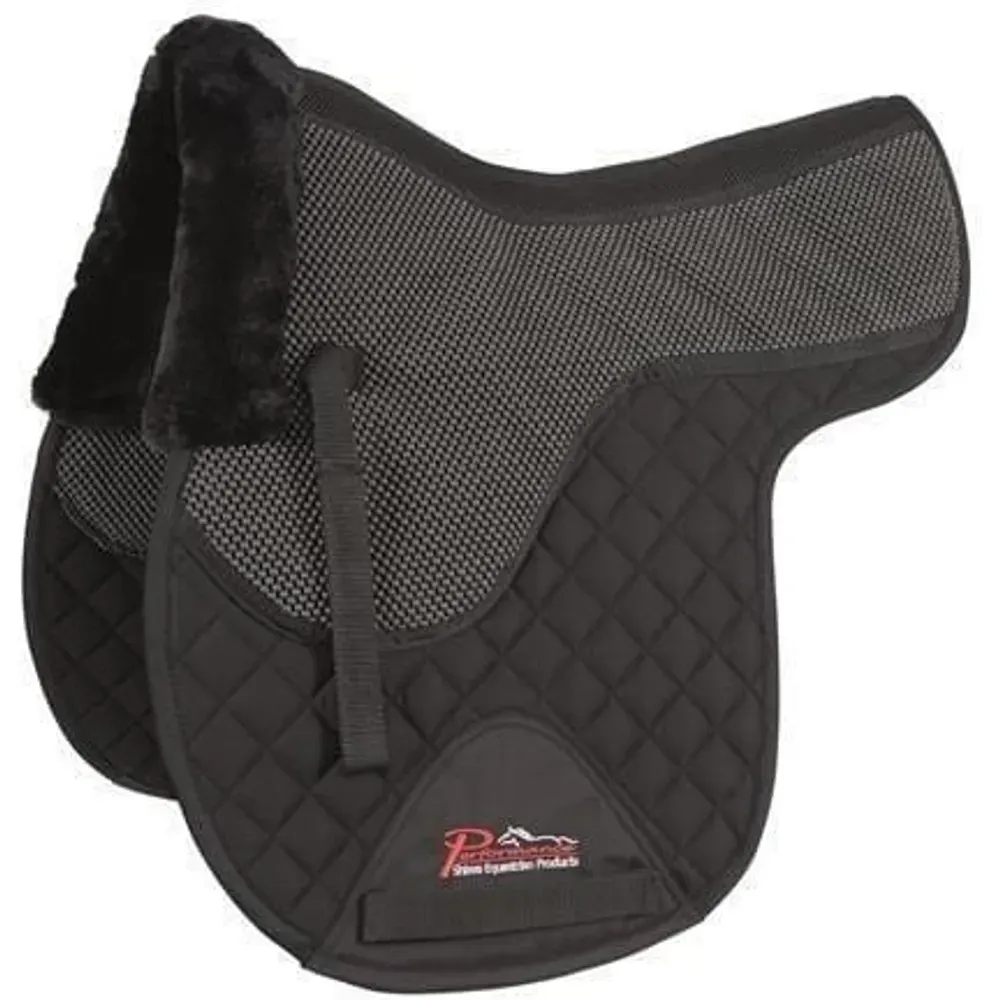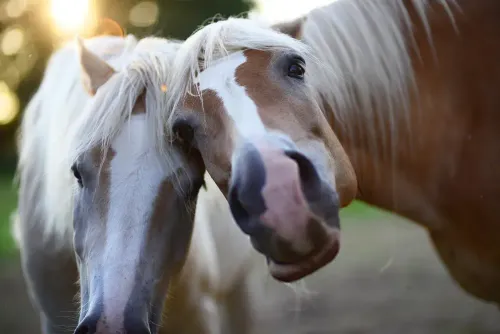
Table of Contents
Riding with one stirrup longer than the other will cause your horse's saddle to slip to one side. In addition, certain training methods will cause your horse to develop a one-sided back. Your horse might have this problem due to his natural movement or due to an injury. Finally, your saddle might not fit correctly. Any of these problems will cause your horse's saddle to slip to one side but don't despair as there Is a solution out there.
So why does my horse's saddle slip to one side?
You must look at these four interrelated problems.
- Your body alignment problems.
- The horse's body alignment issues.
- Horse obesity and back conformation.
- Saddle fitting problems.
How does my body alignment cause my horse's saddle to slip?
If the rider has body alignment problems this will stop them from sitting with even stirrup lengths which frequently causes the saddle to slip to the side with the shorter stirrup. There are many causes and sometimes the issue is a curved spine (scoliosis) which can not be solved without medical intervention. However, the alignment problem is often caused by being left or right-handed.
Let's explain what this problem can be.
If you are right-handed you will generally use this side of your body more for carrying and lifting. This means your muscles will be more developed on the right side and it is likely that your hamstring will be tighter on this right leg. If this is so you will find it harder to stretch this right leg down into a longer stirrup. However, your left leg will be comfortable in a longer stirrup.
Sit on the floor and try to touch your toes with your legs stretched straight in front of your body. Do you feel the same pull on the hamstrings running up the back of your legs?
Probably the one on the side where you ride with a short stirrup will be far tighter and more painful to stretch.
Humans have odd leg lengths!
It is normal to have one leg slightly longer than the other and this accounts for why people lost in the wild often find themselves walking in a huge circle back to their starting point.
The solution will be to work at stretching your hamstrings until you can comfortably touch and hold your toes with straight legs. Obviously, this cannot be undertaken if you have underlying medical issues that will prevent this type of stretching. However, assuming that there are no problems you will be able to loosen your hamstrings and sit with even stirrups. It will take patience and daily commitment to gradually stretch your hamstrings.
How does my horse's body alignment cause his saddle to slip?
You will know whether your horse is one-sided in the following ways.
- The way your horse moves and feels when ridden.
- By looking at your horse's back when standing close to his tail.
- Saddle slipping problems when riding even though you have even stirrup lengths.
All horses are naturally left or right-sided. This means they will prefer to canter on either the right or the left leading leg and wish to trot with the rider rising on either the left or the right diagonal. These issues are not generally big problems and can be sorted through correct training. however, they will inform you that the horse is one-sided with unequal muscular development across their back. Correct training will involve teaching your horse to flex correctly with equal ease on a left and a right rein.
Poor training methods will significantly affect a horse's body alignment and this is common with ex-racehorses. Racehorses are expected to race at a very young age and are not schooled to develop equal suppleness along their backs. When a young thoroughbred performs best on a left-handed track it will be trained and raced so that it only gallops in this direction. There are fewer right-handed race tracks in the Uk, however, horses that prefer these tracks will be raced and trained in this direction. In both cases, the horses will become very one-sided, although the high-wither thoroughbred conformation generally keeps saddle slippage to a minimum. Nevertheless, these horses frequently need equine osteopathy /chiropractic support to unlock atrophied muscles and careful rehabilitation programmes to build up good toplines.
How can my horse's weight and back conformation cause his saddle to slip?
If your horse has a barrel-shaped back with low withers his saddle could slip to the left or the right unless his girth is rather tight. If this is the case you must keep your horse very slim so that there is some definition and shape to his back.
Top tip!
A horse with a broad back and no wither definition often has saddle-slipping issues when they carry excess fat behind their shoulder.

A nonslip saddle pad
The Shires Airflow Anti Slip Numnah is very useful for horses with wide backs and low withers.
How can my worn saddle be the cause of my saddle slipping to one side?
This is more common than is realised. You might well have a saddle that did fit your horse's back however, if the panels are no longer aligned with one containing more compressed flocking the saddle will not sit centrally. Just as common, the saddle tree can become broken and this means the gullet plate, saddle bars or springs are no longer functioning and the saddle will no longer sit correctly.
The take-home message
If your saddle slips have it checked with your master saddler and if necessary replace it. Your master saddler will also notice if your horse's back does not appear symmetrical and if this is the case your training programme must address the problem and your horse will benefit from equine back manipulation. If the problem is caused by your back alignment this must be sorted so that you can sit squarely in the saddle. Finally, the problem might be that your horse is too fat and does not have enough back definition. Low withers and a barrel-shaped back will naturally cause a saddle to slip and will require a non-slip saddle pad.

Article Suggestion
5 Money Saving Tips for Horse Owners
